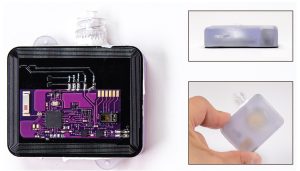Deep brain stimulation induces more healthy neurons and sustained memory benefits in Rett animals

A recent study from the lab of Dr. Jianrong Tang, associate professor at Baylor College of Medicine and principal investigator at the Jan and Dan Duncan Neurological Research Institute (Duncan NRI) at Texas Children’s Hospital shows that deep brain stimulation (DBS) of a specific brain region results in a significant and sustained improvement of memory in Rett mice. Moreover, they found that this treatment promotes the generation of new healthy neurons in these mice.
The study, published in the journal Brain Stimulation, provides crucial preclinical evidence that supports the development of DBS as a feasible treatment for Rett syndrome patients.
Rett syndrome (RTT) is a rare but devastating neurodevelopmental disorder that causes regression of motor, social, cognitive, and language skills along with the development of autistic behaviors and seizures. It is caused by mutations in the X-linked gene that encodes the methyl-CpG-binding protein 2 (MeCP2) protein and thus, primarily affects young girls. Since the loss of cognitive skills is one of the tragic aspects of this condition, there has been intense interest in developing therapeutic approaches to mitigate this loss.
Forniceal DBS induces significant and sustained improvements in learning and memory among RTT mice
DBS is a neurosurgical procedure that involves the placement of a medical device called a neurostimulator to send electrical signals through the electrodes that have been implanted in targeted brain regions to treat various neurological conditions such as movement disorders (e.g. Parkinson’s, tremors, dystonia), neuropsychiatric disorders (e.g. obsessive-compulsive disorders, depression), and epilepsy.
“Inspired by a study which showed that stimulation of the fornix region of the hippocampus improved memory in Alzheimer’s disease, a few years ago we performed forniceal DBS in a mouse model of RTT and found that two weeks of a specific regimen of this treatment improved learning and memory in female RTT mice,” Dr. Jianrong Tang said.
“While those findings demonstrated the potential of DBS to mitigate learning and memory deficits in RTT, it was not clear how long the benefits of this treatment would last.”
Their goal in this study was to address that question. Using well-established behavioral assays, they discovered that DBS improved contextual fear memory in RTT mice and these beneficial effects persisted for 6 to 9 weeks after the treatment. Further, repeated DBS—specifically in the fornix, not other brain regions—maintained the contextual memory improvement in RTT mice.
Forniceal DBS induces the production of new hippocampal neurons in adult RTT mice
Adult hippocampal neurogenesis—the process of forming new neurons in specialized regions of the hippocampus of adult animals—is critical for the neurons to “learn and remember.”
Previous studies from the Tang lab revealed that right after the DBS treatment, there was a significant formation of new neurons in specialized regions of the hippocampus. Since it takes anywhere between 2-5 weeks for newborn neurons to be mature and functionally integrate into the neural networks, this correlated with improved contextual memory in these mice three weeks later. Here, they found this close correspondence between the DBS-induced birth of new neurons and improvements in contextual memory persisted several weeks after the treatment as well.
Forniceal DBS promotes a neuroprotective environment with healthy neurons
In female mice that carry one copy of defective MECP2, the expression of this gene is switched off/inactivated in some neurons. This means some newborn neurons in RTT mice will be healthy and have MeCP2 while others may not express MeCP2. Interestingly, the Duncan NRI team found that forniceal DBS preferentially induced the birth of more healthy neurons with MeCP2 in Rett mutants.
Moreover, DBS treatment also induced the production of a key neurotrophin -brain-derived neurotrophic factor(BDNF)—which is a neuroprotective molecule essential for the survival and growth of neurons as well as for their plasticity i.e., their ability to learn and remember.
“The findings from this study are very promising. We found forniceal DBS not only results in a significant and long-lasting improvement to memory in Rett animals, but that it also promotes a favorable neuroprotective environment in the brain and leads to the production of more healthy neurons—which together suggests DBS could be an excellent therapy to treat Rett patients,” Dr. Tang said.
More information:
Qi Wang et al, Forniceal deep brain stimulation in a mouse model of Rett syndrome increases neurogenesis and hippocampal memory beyond the treatment period, Brain Stimulation (2023). DOI: 10.1016/j.brs.2023.09.002
Citation:
Deep brain stimulation induces more healthy neurons and sustained memory benefits in Rett animals (2023, October 13)
retrieved 13 October 2023
from https://medicalxpress.com/news/2023-10-deep-brain-healthy-neurons-sustained.html
This document is subject to copyright. Apart from any fair dealing for the purpose of private study or research, no
part may be reproduced without the written permission. The content is provided for information purposes only.








